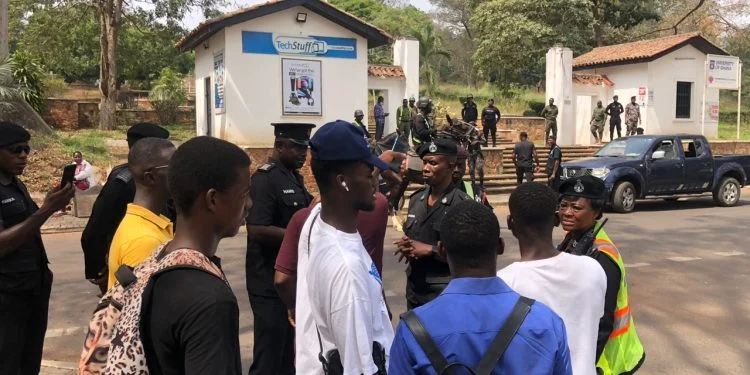On January 16, 2023, approximately 40 continuing students from the University of Ghana’s Commonwealth Hall found themselves stranded on campus, unable to access their residence due to a controversial new residential policy. This directive, which reassigns students from Commonwealth and Mensah Sarbah Halls to other accommodations, has sparked significant distress among those affected, with many pleading for the university to reconsider its approach.
A Disruptive Policy Change
The University of Ghana introduced a new residential policy aimed at addressing past conflicts between students of Commonwealth and Mensah Sarbah Halls. Under this policy, continuing students are required to vacate these halls to make room for Level 100 and graduate students. For Mensah Sarbah Hall, only male continuing students are affected by the relocation. The decision, intended to reduce tensions and promote a safer campus environment, has instead left many students in a precarious situation, struggling to find affordable alternative housing.
On January 16, 2023, security personnel turned away approximately 40 Commonwealth Hall students, preventing them from entering their rooms. The abrupt enforcement of the policy has led to widespread frustration, as students reported being caught off guard and unprepared for the sudden displacement.
Students’ Pleas for Support
The affected students have voiced their concerns, highlighting the financial and logistical challenges posed by the new accommodations. Fred Oppong, a Level 300 student, shared his plight with Citi News, stating, “I don’t have any relatives in Accra, so if I’m not being permitted to enter the hall, the best I can do is to loiter around till daybreak.” He expressed disappointment that the university appeared to disregard a court injunction meant to halt the policy’s implementation, adding that the lack of access to his residence forced him to miss classes.
Similarly, Divine Kwaku Kyere, a final-year student, appealed for urgent intervention: “As we speak, school is in session, and I have to forfeit my classes today, just because I don’t have a place to sleep. I don’t have anywhere to sleep, my things are up there.” Kyere’s plea underscores the immediate impact of the policy on students’ academic progress and well-being, as many are unable to afford the alternative accommodations provided by the university.
Legal Tensions and University Response
The policy has faced legal challenges, with some Commonwealth Hall students securing an interlocutory injunction on January 6, 2023, to prevent the university from enforcing the new residential rules. Despite this, students accused the university management of ignoring the court order, exacerbating their sense of abandonment. On January 12, 2023, during an interview with Umaru Sanda on Eyewitness News, Senior Assistant Registrar Madam Pascaline Songsore defended the university’s actions. She clarified, “We have said time and again in the notice released on January 11, 2023, that those residents in the halls were assigned to the halls before the injunction came.”
Songsore emphasized that the university was not violating the injunction, as room allocations for Level 100 students had ceased pending the resolution of the legal matter. “Our lawyers are working on that, so there is no flouting of anything at this stage,” she added, noting that the rooms were occupied prior to the court order.
A Call for Resolution
The heavy security presence on campus on January 12, 2023, as students returned, highlighted the tension surrounding the policy’s implementation. The stranded students, many of whom lack alternative housing options in Accra, are urging the university to provide affordable solutions and address their immediate needs. The situation raises broader questions about student welfare and the balance between administrative decisions and their impact on academic life.
As the University of Ghana navigates this controversy, the affected students hope for a swift resolution that allows them to resume their studies without further disruption. The administration’s response in the coming days will be critical in addressing the concerns of its student body and restoring stability on campus.






